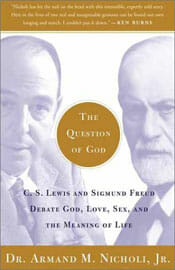
The intriguing premise of The Question of God may yet seduce me into a second reading, but the first left morning-after doubts as to whether I’d allowed myself to be blandished into an emotional conclusion I might otherwise have been intellectually advised to reject. Not that Armand Nicholi proposes a final answer to any of the “life, the universe, and everything” questions he assembles for his august debaters. His even-handed, open-minded presentation lives up to the Fox News slogan. Still, I can’t escape misgivings about his choice to mix biography with philosophy, which slants the field.
We’re all steeped in Freud, whether any of us recognize it. The founder not only of psychoanalysis but of all modern understanding of the mind, his medical theories influence everything from language to law. But the scientist became a philosopher as well, and here Nicholi pairs him with Lewis, literary scholar and renowned Christian apologist, triangulating from their irreconcilable worldviews on the great questions of existence. It’s an irresistible team-up. Imagine these brilliant, articulate men standing at twin podiums, each civilly taking turns building up his own ideas and perforating his colleague’s. It gets even better with the realization that these two are matched not only in insight and eloquence, but—despite the generation’s gap between their lives—by strikingly parallel personal experiences: tragic losses, deep resentments, hostile environments and the atheism Freud espoused all his life, but which Lewis famously abandoned (at first most unwillingly) for faith.
Unfortunately, the more the book relates of each man’s life, the less it distinguishes between their personalities and paradigms. Instead of a clinical comparison of the materialist and spiritual models through formal, published writings, we meet—through personal letters and the anecdotes of loved ones—two human souls, in all their complexity and contradiction, weighing in on the views for which they stand. Whatever the abstract merits of Freud’s positions, when presented like this, who can possibly embrace his circular bitterness over Lewis’ lucid serenity? While I share Lewis’ spiritual construction, I’m disturbed that the materialist view challenges me so little here, filtered through Freud’s gloom and arrogance.
The Question of God comes up empty not because it fails to provide an answer, but because it cannot help providing one.